“Love conquers all things; let us yield to love.” It would be perfectly reasonable to misattribute this quote to a famous early church father or a book from the Bible. Instead, it is from the great Roman poet Virgil.
Anyone familiar with Dante’s Divine Comedy will remember that Virgil is a prominent character, serving as Dante’s guide through hell and purgatory. Saint Augustine, while critical of aspects of Virgil’s mythopoetic political theology, held him in great esteem and went so far as to call him the “best and most renowned of all poets.” Furthermore, T.S. Eliot considered Virgil the greatest poet of the Western tradition and called the Aeneid “our classic.”
Why was Virgil so important to generations in the past, and why does he remain an indispensable figure for our adrift lives today? In De Doctrina Christiana, Augustine provided a lengthy commentary on the relationship between signs and things. The beauty of things in the world, Augustine wrote, is ultimately and properly a sign of the beauty and truth that emanates from the uniquely beautiful and truthful thing: God Himself. In the Confessions and in his rebukes to the Manicheans on Genesis, Augustine also remarked that all of material creation has some level of beauty to it since it subsists in God’s loving wisdom, even if we can’t quite see or understand the beauty, for instance, of a fly or maggot.
One of the most common Virgilian themes aligns with this theological conviction: love is the most powerful force in the world. The power of love is all consuming and all desiring, and Virgil’s advice is to give oneself over to the desire and power of love. Many later Christians came to recognize the basic truth to Virgil’s poetic proclamations of how yielding to love can transform the soul.
In the Eclogues Gallus is a dying, lovesick, man who yearns to be consumed by love—a love which he himself knows well but could not consummate in life. In the serenity of his countryside estate, the Elysian idyll if there ever was one, he utters those immortal words: Omnia vincit amor: et nos cedamus amori. Love conquers all; let us yield to love!
Of course, Gallus says this tragically. As we know, he loved Lycoris and devoted himself to her. She, however, didn’t reciprocate and eventually abandoned him. Thus, Gallus wallows alone in isolation and grows “mad” with his memories of love and desire for love. Even the gods were unable to cure Gallus from his spell of love signifying how love stands above the pagan deities, love transcends all material things.
The failure of the gods to break the spell of love reveals Virgil’s insight that love is the greatest and grandest thing in the cosmos, for it is beyond even the control of the gods. In suffering or in joy, we cannot escape the consuming power of the fire of love itself. If only Lycoris had yielded to love the two would have been together in tender intimacy until their dying breaths. This, it seems, is what Virgil is subtly promoting: for love to conquer, two creatures must yield to its invitation.
Benedict XVI reminded Christians in Deus Caritas Est that God is a God of both eros and agape. God is a burning and devouring flame of love that desires all humans to experience love, beauty, and happiness. Being made in the image of God (imago Dei) means all humans also exude that flame of desire to be in union with the love, beauty, truth, and happiness found in God. As Saint John Paul II also wrote, expressing much the same idea, all persons are called to greatness so that their souls desire to come into union with God who is love and whose love makes all things whole.
When the early Christians, and especially Augustine, encountered pagan philosophy and poetry they were moved by the beauty and the signs of truth that they saw. More recently, Christians like C.S. Lewis have noted that if Christians truly believe in a living God who is the creator of the cosmos then why is it not possible that this God dispensed signs of truth and beauty to the pagans in preparation for the eventual incarnation of Christ? The idea that all things beautiful and truthful (no matter their gradation away from the fullness of truth) are really signs pointing, and belonging, to God has long been a pillar to Christianity and Christian culture.
Christianity proclaims, through the doctrine of imago Dei, that all persons are made in love for love. Love, as the intention of union between two things, is a natural and instinctively social endeavor. Harmonia, after all, requires at least two partners to be in union together; one cannot be in harmony by itself but only with and through an other. Solitude, by definition, cannot be harmonious. Like Gallus, then, we who live in loneliness and shut ourselves off from love (failing to yield to love) suffer, though we may have, at some point in our lives, tasted the nectar of love that makes life sweet and calls us home. Tragic indeed. But within that tragedy are the seeds of truth.
In contrast to solitude and loneliness, human love and friendship, according to Augustine, allow us to participate in the love that defines the divine Trinity. Just as the Trinity is a “relations of love,” so too is friendship between humans a relationship governed by love. The highest expression of this participation in love is love consummated through marriage. In reading Virgil, along with other classical authors, Augustine saw the traces of this truth in the yearning cries for friendship and love.
Friendship and marriage allow us to practice imitatio Dei (imitation of God, who is Love). When two (or more, in friendship) images of divine love are united together in harmony the participation of love which occurs becomes a mirror of the love of the Trinity. Augustine poetically summarized this reality as such, “When we see love, we see the Trinity.”
This returns us to the great sage and poet who became a guide and father figure to Dante in hell and purgatory. Virgil is right that love is a real and powerful force in the world. He is right that it is a beautiful and desirable thing for people to seek union with one another in love. He is right that love is rational as well as instinctive. He is right that we should yield to love and that love conquers all things. Augustine may have wept for Dido because he was originally trapped in carnal love and beauty; but even carnal love and beauty are signs of the true love and beauty of God when properly understood and ordered, thereby directing one toward the upward union with Supreme Goodness as they “sing songs of ascent.”
This is what the Church Fathers understood when they read Virgil. There was tremendous beauty in the writings and themes of the greatest of the Roman poets. One cannot help but be moved to tears when reading Virgil, just as Augustine was. (Even more-so in Latin where the lyrical grace of Virgil can be fully heard.)
Where Virgil went wrong, however, was to associate desire only with other humans, locating the hope of desiring fulfillment in another human rather than the source of transcendent love itself that makes humans beautiful. Virgil’s humanism, therefore, is but a shadow to the humanism offered in Christian anthropology where the human soul and person finds greater fulfillment through love of God. Christianity’s vision of love offers an even greater humanism than Virgil, for through the image of God in us, humans are made even more beautiful. In recognizing the divine image within us, Augustine would argue in De Trinitate, we are made all the more beautiful since beauty comes with understanding and not just pathos.
Nevertheless, Virgil’s themes ring true to any Christian: signs pointing to the truth, love, and beauty that is God—this is what Augustine and the early Fathers understood in reading Virgil and why Virgil’s always had a longstanding place within the Christian literary canon though he himself was not a Christian. Virgil’s themes, from Christian eyes, are signs pointing to the revelation of Christ and the Church. Here we find the enduring and eternal power of love and how it binds all things together and how only in this union through love the desires of the heart can be satisfied. Virgil was close, as close as one could get prior to the revelatory incarnation of Love itself in flesh and blood.
The desire to love and the desire to be in union with another, as Dante weaves into the structure of his Christian poem (for he is only alone at the beginning when he is lost), is the driving force of salvation. Humans desire love and God desires us to love. In Christianity the two desiring flames of amore/eros come together in union which is then superseded by agape: the compassion and tender mercy that emerges out of that desiring love that brings souls together. Unsurprisingly, Christian readers of Virgil saw the same spirit in his poetry. We ourselves, as readers, coming into relationship with Virgil’s characters often end up having pity and compassion toward them—perhaps the finest realization of how that desire for love produces agape.
T.S. Eliot remarked that the loss of the classics, Greek and Latin, would spell the demise of Christianity and, eventually, the whole of Western civilization built on the heart of love which breeds compassion (and it should be noted that compassion is impossible without that desiring love which precedes it). Per the ironies of history, it seems that Virgil is now far closer to the Christian truth than many of us in the modern world drowning in relativism, proclaiming love is just the stimulation of atoms, and enslaving ourselves to the tyranny of technology. But that also means that in reading Virgil—just as the Church Fathers did two millennia ago and Christians have done ever since—we may once again see the beauty and truth of the signs in Virgil’s writings that can lead us back, and nearer, to Love itself. As Christians teaching and reading Virgil, we must never forget this.
So, on to your great honors, child! The time is near, Dear child of the gods, great increment of Jove. See how the vast round world bows down— Land and tracts of seas and depthless skies. See how all creation joys in the time to come!
May Beatrice indeed sing praises of Virgil to God. Virgil’s writings capture the signs of the human spirit and condition. In the melancholic world of Antiquity Virgil stood out as a light in the darkness. But it was necessary to capture Virgil’s signs of light and direct them to their source as the Church Fathers did. Perhaps the time is coming again when Virgil will be a bright light in the darkness and Christians will, once more, capture that light and orient the crying soul to the Good, True, and Beautiful rather than remain lovesick in bed or alone on golden sands. Our world cries out like Gallus for that healing love that mends the soul. Let us shepherd it to the only source of fulfilling love. Our souls depend on it.
Image Via: Flickr





